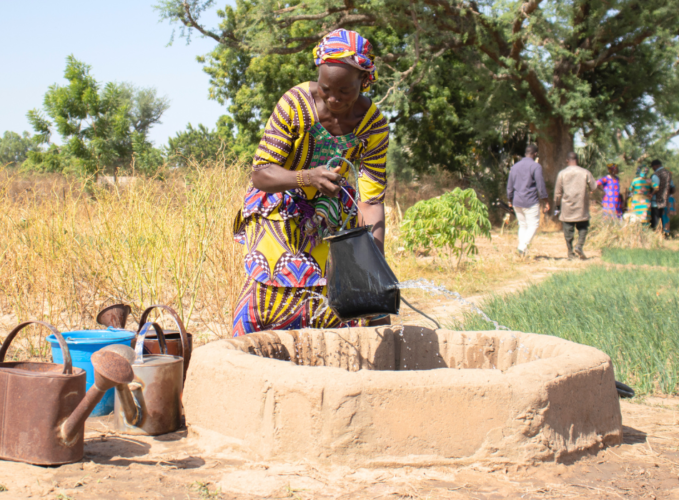This International Day of Care and Support, Farm Radio is pleased to announce its new Knowledge Sharing About Unpaid Care in sub-Saharan Africa project.
Care work — caring for children, the elderly and other vulnerable people, as well as performing other household chores — often falls to women. Globally, women perform 76.2 per cent of the total amount of unpaid care work — spending three times more time on it than men.
That’s why, thanks to an almost $1 million grant from Global Affairs Canada, Farm Radio International will be working towards a more just and equitable sharing of unpaid care and domestic work across sub-Saharan Africa during the next year.
In partnership with UN Women and FEMNET, the African Women’s Development and Communications Network, the Knowledge Sharing about Unpaid Care in sub-Saharan Africa project will increase the representation of unpaid care workers in public dialogues about gender-transformative approaches to unpaid care work; increase recognition of the value and inequity of unpaid care work; and increase the commitment by decision makers and duty bearers to respond to the rights and needs of unpaid care workers.
Care work, both formal and informal, is an essential role in society, but it often goes unnoticed, is unappreciated and is highly gendered. In sub-Saharan Africa, and indeed, around the world, caring for children, older persons and persons with long-term illness or disabilities often falls to women, as does cooking, personal care, cleaning, collecting firewood or shopping.
It restricts women’s life opportunities such as education and employment, and affects social engagement and leisure time, therefore affecting women’s health and poverty levels. Yet, in order for change to be made, collective action at all levels is required.
First, Farm Radio will work with local women’s rights organizations to design and run a series of On Air Dialogues in five countries (Burkina Faso, Ethiopia, Malawi, Nigeria and Tanzania) that will invite women to share their views, thoughts and opinions on how unpaid care affects them, while also gathering opinions from other community members. The results of these discussions will be used to contribute to national and Pan-African policy discussions on unpaid care.
Secondly, Farm Radio will coach members of its network of broadcasters in eight countries to air a series of educational “Script+” radio programs collectively designed at a national level about unpaid care work. These programs will raise awareness and spark conversation on the unfair burden of labour that falls to unpaid care workers.
Thirdly, Farm Radio will run a “Network-based campaign” by building a resource kit, complete with information packs, guides and programming suggestions, as well as an online discussion for our Pan-African network of more than 1,300 radio stations in 38 countries. These packs can be used by stations across the continent to inform and build their own programming on unpaid care.
“It’s so important to recognize and amplify the voices of the women who are so often tasked with this unpaid care work,” said Blessing Uwechia, Farm Radio’s Nigeria project lead. “Their role in society should not go unnoticed and we hope to spark greater conversations about unpaid care both here in Nigeria and across the continent with this project.”
These programs should reach more than 6 million people across the continent, sharing stories and starting dialogue about unpaid care.
It’s an issue that requires common understanding, and while significant policy strides have been made in recent years, collective action and agreement is required to translate this into practical action and changes in the day-to-day life of women and girls.
It’s a change that we hope to see start with this project.
About the project
The Knowledge Sharing about Unpaid Care in sub-Saharan Africa project aims to increase gender equality and women’s empowerment through a commitment to more just and equitable sharing of unpaid care and domestic work within the household and the family in sub-Saharan Africa. The project will concentrate on Burkina Faso, Ethiopia, Malawi (through partner organization, Farm Radio Trust), Nigeria and Tanzania, expanding educational radio programs to the additional countries of Ghana, Mali and Uganda and providing resources to our network based in 38 countries to run programming supported by those informational resources. This project is funded by the Government of Canada. Learn more about Farm Radio International: https://farmradio.org/

